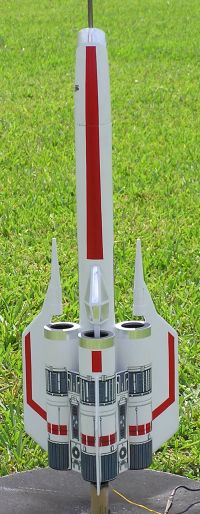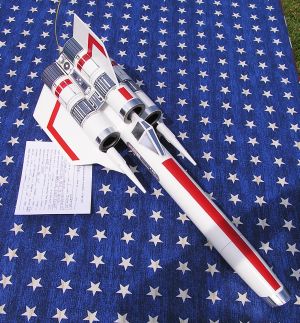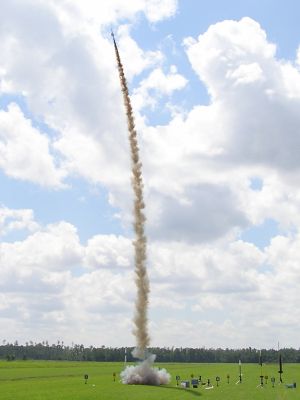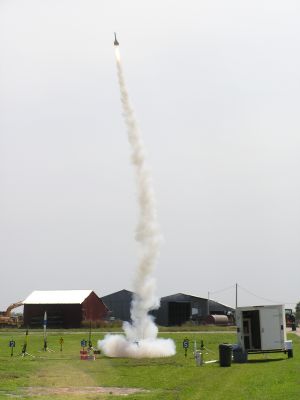Scratch Colonial Viper 2x Original Design / Scratch Built
Scratch - Colonial Viper 2x {Scratch}
Contributed by Susan DeBerg
| Manufacturer: | Scratch |
Brief:
A slightly modified mid to high power ~193% upscale of the Estes OOP kit using
a single 10" long 29mm mount.

Construction and Finishing:
The parts list:
- 1 Aerotech 1.9" body tube for airframe, 18,5" long
- 3 Aerotech 1.9" body tube for turbos, each 7.75" long
- 1 Aerotech 1.9" nose cone
- 1 Aerotech 1.9" tube coupler
- 2 6"x12" sheets of 1/8" 5-ply aircraft plywood for 2 wings and tail fin
- 2 1/8" plywood 1.9"-29mm centering rings for MMT
- 3 1/8" plywood 1.9"-29mm centering rings for turbo intakes
- 3 1/8" plywood 1.9"-24mm centering rings for turbo exhausts
- 2 5.5"x1" pieces of 1/8" basswood for turbo side panels
- 1 4.5"x1" piece of 1/4" basswood for cockpit support
- 1 10" long 29mm MMT from Totally Tubular
- 3 1" long 24mm foil lined MMT from Totally Tubular
- 1/4" brass tube launch lugs
- 2 caulk tube nozzles
- 1 sheet of gloss heavy card stock
- 2 sheets of clear water slide decal paper
- 1 1 1/4" sink tailpiece extension from Home depot
- 1 chrome die cast ring for the above
- 1 1" E-clip from Home Depot
- 30" PML 'Dura Chute' parachute
- 12' 400# Kevlar® cord for shock cord
- PML expanding foam
- 5 min epoxy
- 30min epoxy
- 6 oz lead sinkers from Wal-Mart fishing dept.
- Chrome foil tape from Western Auto

After scaling up original Estes kit templates 193% (1.88" / 0.976" = 192.623) and printing them out, I transferred them on the two 1/8" plywood sheets adding a 3" wide x 1.9" deep tang on each fin for thru-the-wall mounting and carefully proceeded to cut them out with a DeWalt cordless jig saw. Once cut, I sanded a bevel on the leading and trailing edges of both wings and the leading edge of the tail fin using a belt sander first and hand sanding with a block for a final shape. I took the leftover pieces of plywood to my drill press and using different sizes of hole saws, cut out 5 rings to fit between AT 1.9" tubing and 29mm motor tube plus another three to fit a 24mm motor tube. If you don't have a drill press handy, you can order all those rings from one of several online sources.
Once all that was done, I cut the 1.9" AT tubing to length, one 18'5" piece plus three 7.75" pieces. [Note that all these pieces are ~1/4" longer than scale.] I cut the nose cone at an angle with a razor saw to a length of 5" on top and 4" on the bottom again going 3/4" over scale.
Between the body tube and nose cone, I managed to sneak in an extra inch of airframe length that doesn't change the looks noticeably, but that one inch pays off later when balancing off this bird.
After a 29mm MMT from Totally Tubular got chopped at 10" length, I took the 1.25" plastic sink tail piece extension and cut it up right where it widens a little. That got JBWelded onto the MMT so that it stuck out 1/4" past the end of the MMT. After that cured a bit, I slid the bottom ring all the way down right next to it and the top ring 1/2" from the top. Before installation I dremeled two small notches in the inside of the top ring for 400# Kevlar® cord to fit through. I doubled 30" length of the cord, slid both ends a good inch past the top ring, and slopped on a generous amount of 30 min epoxy over the whole mess.
While that was curing, I cut the body and turbo tubes to length, slotted them with a hobby knife to fit TTW fin tangs, marked them for position, and tacked them together very lightly with 5min epoxy followed by strong fillets of 30min epoxy on every seam. Next was time to install the fins and instead of upscaling that original template that'd be rather awkward to use in this size, I just measured the angles with a protractor, fine sanded the fin tangs to correct length, and tacked them on with 5min epoxy while using that very same protractor to keep things lined up while the epoxy cured. Again, a lot of 30 min epoxy was used for all the fin fillets both inside and outside of tubes for rock solid construction.
While I was rummaging through the garage looking for my PML expanding foam, I found a handful of unused caulk tube nozzles that looked like a good fit for laser cannons. After cutting off the flanges with a razor saw and dremeling a groove on the side, two of them were installed in the wing mounts with epoxy for a pair of nice looking cannons. Since I had some epoxy left in the batch, I also glued on the brass launch lugs for a 1/4" rod.
At this point I sprayed on two coats of Kilz white primer sanding in between and after to a smooth finish. A day later I followed with several thin coats of Krylon gloss white. The next day I used blue tape to mask the stripes on both wings, top and bottom, on top turbo, and on the nose with Krylon Banner Red that seemed like a perfect match for the red in the decals I upscaled and printed (and clear coated) the night before.
On to the canopy... After upscaling and printing the original on a glossy sheet of heavy cardstock, I carefully cut it out, creased and folded it to fit over a cockpit support bracket cut out of 1/4" basswood using upscaled original template. I mixed a batch of 5 min epoxy and brushed it carefully all over the inside of canopy and bracket to lock them together followed by a filling of PML foam. Needless to say, its pretty much rock solid too.
After the Krylon white on the canopy dried up, I used some chrome metal foil tape from Western Auto to cut the simulated cockpit windows and 1/2" wide strips around nose and turbo intakes. Then the previously painted turbo side panels got epoxied on followed by all the decals. The next day after the decals had dried up, I installed the silver turbo intake and black exhaust rings that I'd built and painted a few days before here and there in between the major steps using 3 intake rings, 3 exhaust rings, 3 one inch pieces of BT-50, and that AT 1.9" coupler sliced into three pieces for exhausts. Then I attached the canopy with 5 min epoxy only since they're all cosmetic parts without structural load.
Next came what I thought to be the last major step: installing the MMT with plenty of 30min epoxy. Remember to put a casing in the tube first before installation, follow it up with 1" E-clip, and thread on the ring tight so you get the right fit when everything cures up. No problem here...
...Except for the nose weight! After MMT had cured through, I filled a 29mm casing up with quarters to a weight of 290 grams to simulate H97J--the heaviest load I planned her to fly with--and installed it into MMT. And it looked like to get her to balance safely at 10" from top of the body tube (according to RockSim and Barrowman), a whopping 9oz of nose weight was needed. After some skullduggery, I realized that if I can move the weight 4" more forward instead on the bottom of the cone, only 6oz would be needed. So out comes the PML foam again to fill up the space, followed by 6oz of lead sinkers sandwiched between two hefty layers of 30 min epoxy to firmly keep it in place. She balances just right with 3oz less weight. This is where that one extra inch of airframe length really paid off!
After touching up the paint on the nose cone, she was sprayed over twice with Rustoleum Crystal Clear that I've found to be safe with homemade decals (as clear Krylon topcoat bleeds the inkjet ink).
Yet one more hitch; I originally planned to use 3/8 flat nylon webbing for a shock cord, but after dry fitting a PML 30" chute, I found there was no way it would fit nor would the heavy Kevlar®/Nomex® shield fit!
Back to rummaging through the stockpile...after digging out a rooster tail of rocket parts I found another 10' length of 400# Kevlar® cord for a shock cord and a patch of Nomex® flight suit to make a chute protector of. Whew! I was finally done! This was turning into an epic...
PROs:
- Ease of painting since it's mostly white with a few red stripes easy to mask.
- Ease of applying decals as all waterslides are fairly large, easy to handle, and easy to line up due to numerous parallel seams and lines. Also cutting up chrome foil tape is a rather straightforward process.
CONs:
- All the multiple angles to consider when installing wings, canopy and laser cannons. It's best to use 5 min epoxy and just hold the parts in correct positions with fingers until tacked on lightly, then go over with 30min epoxy for strength.
- There is a rather cramped space for recovery gear. If you prefer staying below H power, you can shorten MMT at least three inches for more space, but since I'm a known nut, I decided to go all the way up to 29/240 power. Peer pressure is a terrible thing!
- Upscaling original decals is a process where I pulled a brain muscle at least half a dozen times before I got it right. My advice is to keep printing on plain paper first and trying it out until you get it right.

Flight:
Once I got her finished up and loaded, I was able to fine tune simulations
using real weight and Cg as reference.
She sims beautifully on H97J-M and H238T-M, followed closely by H128W-M and G75J-M both deploying slightly early, and with H180W-M and H220T-M ejecting slightly late. She is also flyable with F40W-4, F52T-5 and G64W-7 29/40-120 motors, since usually Aerotech so generously includes almost a full second worth of free bonus delay with the hobby line reloads.
For the first flight I chose an H128W-M. That motor simmed a half a second early under ideal conditions but would likely be just right on a blustery day like it was. When the Launch Officer read my flight card, his first response was, "You're flying that with WHAT ?!?" However, once he realized the Viper's hefty liftoff weight of almost 38oz in a compact 24" package, it was alright. After the usual first flight heads-up warnings, he had to add: "This oughta be interesting, as the rocket ain't much bigger than the casing." He checked the range one more time before counting down 3...2...1...Liftoff! The AT H128W came under pressure immediately and WHOOOOOSH! It was gone! She literally ripped off the pad doing a light spiral on the way up, then coasted and coasted... finally started tipping over at apogee and POP! Ejection was right on cue like flying with altimeter.
The chute was slightly wadded up in the Nomex® blanket at first, but after a couple of the longest seconds I've experienced in my life, it decided to billow out for a controlled descent. A split second before touchdown a gust of wind hit her and swung her wide, thunking her down on the port side rear wingtip and a hard roll at landing, which was a good hike away. Besides a few green grass smudges, no damage done. A successful flight !
 Second flight was a couple months later at our usual THOR field,
and I sent her up on an AT G64W-7. This load sims good with plenty of speed off
the rod, but in reality it seemed to be somewhat underpowered. The Viper took
off in a hurry but showing all the characteristics of the Estes original, cork
screwing quite a bit on the way up. Ejection was a tad late (should have
drilled the delay down to 6 seconds) resulting in an inch long zipper that was
easily repaired.
Second flight was a couple months later at our usual THOR field,
and I sent her up on an AT G64W-7. This load sims good with plenty of speed off
the rod, but in reality it seemed to be somewhat underpowered. The Viper took
off in a hurry but showing all the characteristics of the Estes original, cork
screwing quite a bit on the way up. Ejection was a tad late (should have
drilled the delay down to 6 seconds) resulting in an inch long zipper that was
easily repaired.
Third launch was at NEFAR HPR field later in the year, this time I prepped her with AT H97J-M, and she took off straight as an arrow with ejection right at apogee. It was a beautiful flight on a gorgeous Florida day.
The Viper design seems to love power--the more you give her, the better she flies. I noticed the same characteristics also on my slightly smaller 1.7x upscale ones, but that's another story...
Summary:
This was by far my most challenging build up to date. It was rather tricky to
stuff a big motor capability, a good size chute, and all 6oz of needed nose
weight into a rather compact 1.9" by 24" package while keeping her
rather robust so she comes down fast and is able to fly on our usual small
mid-power field. But also seeing her rip on H128 on a windy day for a perfect
flight made this the most rewarding build I've ever done.
I'd like to thank Leo of Germany, Secret Squirrel, Vanel, Justin and BrianC of The Rocketry Forum as well as Verna's Vipers and Jason Ware's websites for reference, support and inspiration behind this project as well as all the other rocketeers that kept egging me on. Thank you all. I couldn't have done this without your help.
 |
 |